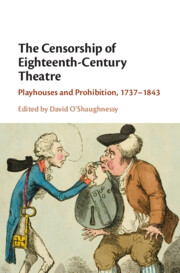Book contents
- The Censorship of Eighteenth-Century Theatre
- The Censorship of Eighteenth-Century Theatre
- Copyright page
- Dedication
- Contents
- Figures
- Contributors
- Acknowledgements
- Abbreviations
- Introduction
- Part I Gender
- Part II Politics
- Chapter 4 Theatrical Censorship and Empire
- Chapter 5 Adapting Caleb Williams for the Stage
- Chapter 6 Knave or Not?
- Part III Performance
- Bibliography
- Index
Chapter 4 - Theatrical Censorship and Empire
from Part II - Politics
Published online by Cambridge University Press: 03 August 2023
- The Censorship of Eighteenth-Century Theatre
- The Censorship of Eighteenth-Century Theatre
- Copyright page
- Dedication
- Contents
- Figures
- Contributors
- Acknowledgements
- Abbreviations
- Introduction
- Part I Gender
- Part II Politics
- Chapter 4 Theatrical Censorship and Empire
- Chapter 5 Adapting Caleb Williams for the Stage
- Chapter 6 Knave or Not?
- Part III Performance
- Bibliography
- Index
Summary
This essay explores some of the plethora of modes of censorship of British ‘imperial’ theatre through the long eighteenth century. Suppression ranged from the informal censorship of ‘Oriental’ performance practiced by Sir Richard Steele in managerial practice and periodical censure through cancellations of productions of Patriot drama attacking colonial slavery deemed offensive by Walpole’s Licenser. While productions set in distant lands increasingly offered an allegorical means of critiquing British imperial practices, in the decades of reaction following the French and Haiitian Revolutions, plays that explicitly denounced English participation in the slave trade, such as Oroonoko, were eventually expunged from the stage by nervous managers. Helping explain this managerial censorship. William Hazlitt’s amazed and anxious response to a rare performance of Oroonoko in 1815 reveals the terror inspired in White audiences by the belief that Black spectators might re-enact the slave revolts modelled on stage by heroic African protagonists. Censorship of imperial subjects thus ranged from the attempted control of dramatic subject matter through to the governmental or managerial erasure of texts and performances deemed subversive or revolutionary.
- Type
- Chapter
- Information
- The Censorship of Eighteenth-Century TheatrePlayhouses and Prohibition, 1737–1843, pp. 95 - 113Publisher: Cambridge University PressPrint publication year: 2023
- 1
- Cited by

